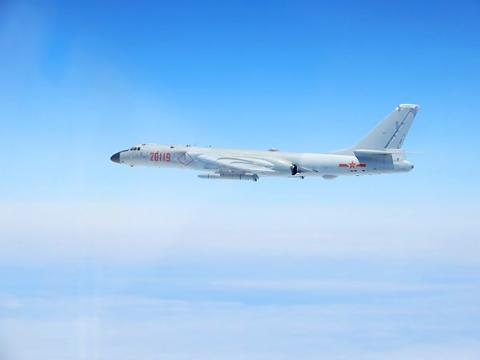Officials are evaluating the possibility of procuring M1A2 tanks, but the nation also hopes to build some of the tanks domestically, Minister of National Defense Yen Teh-fa (嚴德發) said yesterday.
Yen made the statement at a meeting of the legislature’s Foreign and National Defense Committee, which was scheduled to review the potential effects of proposed pension reform on military personnel once the plan is implemented in July.
Democratic Progressive Party Legislator Tsai Shih-ying (蔡適應) asked if the ministry has a new plan for its tanks, given the new challenges posed by a strategic shift to focus on asymmetric warfare.

Photo courtesy of the Ministry of National Defense
While the demand for tanks is high, as they are key in winning decisive littoral battles, the military and the US are in the process of assessing the possibility of a deal, Yen said, adding that the government has not yet made an official purchase request.
However, the government would not obtain the tanks through purchase only, Yen added.
“As we are seeking to build up our defense industry, we hope that we can build our own tanks, as we are doing with submarines and fighter jets,” Yen said.
The government also hopes to form a technical partnership with the US to authorize the tanks’ construction or assembly in Taiwan, Yen added.
The ministry’s Department of Strategic Planning said it aims to finish the assessment by the end of the year.
The ministry has been planning to acquire new tanks to replace old ones, but the plan was postponed several times, as priority was given to the purchase of surface-to-air missiles and attack helicopters.
In February, it was reported that a plan to purchase about 100 M1A2 tanks was again sidelined, as the US said the tanks might not be able to reach full functionality if they are used in Taiwan.
Meanwhile, Yen said that the Taiwan Strait and South China Sea could become the new conflict hot spots after an easing of military tension on the Korean Peninsula following the peace agreement reached last week by North and South Korea.
Asked by Chinese Nationalist Party (KMT) Legislator Johnny Chiang (江啟臣) about military developments across the Strait, Yen said that the Chinese navy is likely to increase long-distance exercises, which would evolve from single to combined exercises.
Yen also explained the change in objective for the first phase of this year’s Han Kuang exercises, which began yesterday and is to end on Friday.
The ministry last year simulated a response to the scenario of China’s People’s Liberation Army attacking Taiwan in 2025, but the simulation this year is focusing on how the nation would defend itself given its current military capabilities.
“Our new combat strategies focus on winning battles at littoral zones and fighting enemies at beachheads. We want to use the annual drill to test these plans,” he said. “Rather than 2025, we want to test them based on where we and the enemy stand at the moment.”

A magnitude 7.0 earthquake struck off Yilan at 11:05pm yesterday, the Central Weather Administration (CWA) said. The epicenter was located at sea, about 32.3km east of Yilan County Hall, at a depth of 72.8km, CWA data showed There were no immediate reports of damage. The intensity of the quake, which gauges the actual effect of a seismic event, measured 4 in Yilan County area on Taiwan’s seven-tier intensity scale, the data showed. It measured 4 in other parts of eastern, northern and central Taiwan as well as Tainan, and 3 in Kaohsiung and Pingtung County, and 2 in Lienchiang and Penghu counties and 1

FOREIGN INTERFERENCE: Beijing would likely intensify public opinion warfare in next year’s local elections to prevent Lai from getting re-elected, the ‘Yomiuri Shimbun’ said Internal documents from a Chinese artificial intelligence (AI) company indicated that China has been using the technology to intervene in foreign elections, including propaganda targeting Taiwan’s local elections next year and presidential elections in 2028, a Japanese newspaper reported yesterday. The Institute of National Security of Vanderbilt University obtained nearly 400 pages of documents from GoLaxy, a company with ties to the Chinese government, and found evidence that it had apparently deployed sophisticated, AI-driven propaganda campaigns in Hong Kong and Taiwan to shape public opinion, the Yomiuri Shimbun reported. GoLaxy provides insights, situation analysis and public opinion-shaping technology by conducting network surveillance

‘POLITICAL GAME’: DPP lawmakers said the motion would not meet the legislative threshold needed, and accused the KMT and the TPP of trivializing the Constitution The Legislative Yuan yesterday approved a motion to initiate impeachment proceedings against President William Lai (賴清德), saying he had undermined Taiwan’s constitutional order and democracy. The motion was approved 61-50 by lawmakers from the main opposition Chinese Nationalist Party (KMT) and the smaller Taiwan People’s Party (TPP), who together hold a legislative majority. Under the motion, a roll call vote for impeachment would be held on May 19 next year, after various hearings are held and Lai is given the chance to defend himself. The move came after Lai on Monday last week did not promulgate an amendment passed by the legislature that

Taiwan is gearing up to celebrate the New Year at events across the country, headlined by the annual countdown and Taipei 101 fireworks display at midnight. Many of the events are to be livesteamed online. See below for lineups and links: Taipei Taipei’s New Year’s Party 2026 is to begin at 7pm and run until 1am, with the theme “Sailing to the Future.” South Korean girl group KARA is headlining the concert at Taipei City Hall Plaza, with additional performances by Amber An (安心亞), Nick Chou (周湯豪), hip-hop trio Nine One One (玖壹壹), Bii (畢書盡), girl group Genblue (幻藍小熊) and more. The festivities are to